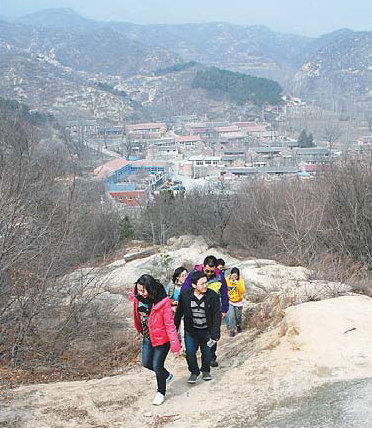Rural reverie isn't far from the capital
Updated: 2013-04-14 08:09
By Li Jing (China Daily)
|
||||||||
|
Giant rocks dominate the mountaintop around Shatanggou and Liugou villages. Bi Jinglan / For China Daily |
In the northern suburbs of Beijing, the Yanqing county features several villages that offer tourists a peek at the traditional rural life of North China. Shatanggou and Liugou, two villages hidden deep in the commanding prospect of the Yanshan Mountains, are among the most popular countryside tourist destinations.
A concrete road diverts visitors from the freeway, snaking its lonely way to the village, Shatanggou.
Except for the road and a two-story office building, the village is a facade of stones. By stacking them up like blocks, farmers have made houses from rocks carved from mountains and held together with an age-old mixture of yellow mud and dried grass. The houses are connected with cobblestone roads, which form a big Chinese character ren (people).
On the stone steps, you will often see elderly women sit and enjoy the sunshine. The village is primitive and tranquil, with the quietness broken with the occasional sound of dogs barking and cocks crowing.
An office building stands out among the farmers' houses with a board hanging prominently - inscribed "Pingbei Hongse Diyicun", which literally translates "The first red village in Pingbei".
Pingbei is the former name of the area, bordering Beijing, Zhangjiakou and Chengde. The village was the first to set up a Party branch in the area.
A series of switchbacks along edges of terraced groves end at a hill trail. A slow-moving stream, covered now with thick layers of dried leaves, runs along it. The hill looks a little gray as winter slowly gives way to spring, but leaf buds sporting lovely bronze-green color are already crowding the branches.
Massive rocks dominate the mountaintop, coated with sand, weathered by wind. On the peak a pine tree stubbornly breaks through the rock, its roots extended in search of the limited soil.
The peak overlooks villages and there is a rock carved with the three characters xiaoxishu, which bears witness to the village's "revolutionary" history.
A countryside tour would not be complete without taking part in a farm family dinner and sleeping on a kang, a traditional heatable brick bed that is only seen in northern villages.
Just two hills beyond is the Liugou village, which is famous for a specialty tofu banquet featuring a hotpot atop burning charcoal with different kinds of tofu - fresh, frozen and deep fried - added to streaky bacon and Chinese cabbage.
Accompanying the cauldron is a spectacular spread of more than 30 dishes, the ingredients freshly harvested from the farms.
You can also find these traditional beds in local farmers' homes. The kang, taking up a large portion of the room, is much larger than typical beds and a flue leads to the outside to take away the charcoal fumes that could be toxic if trapped inside. Inside each bricked platform is an area for firewood, and after hours of burning, the rising heat warms the bed.
Lying on the bare bed feels like a hot-stone spa treatment, comfortable and amazing.
After some time, though, it's a little hard to relax, as you have to toss and turn restlessly to cool down.
The fire is put out after dark and the heat is maintained throughout the night, making for a snug sleep.
Locals get up early in the morning to the songs of birds. The village is in a foggy mist, rather than the haze of the city. It's a peaceful reverie, and urban noise seem far, far away.
If you go
Shatanggou: Take bus line 919 at Deshengmen in Xicheng district to Yanqing. Transfer to bus line 925 and get off at the stop of Bailongtan. Liugou village is reached by bus line 920 from Yanqing.
lijing2009@chinadaily.com.cn

 'Taken 2' grabs movie box office crown
'Taken 2' grabs movie box office crown
 Rihanna's 'Diamonds' tops UK pop chart
Rihanna's 'Diamonds' tops UK pop chart
 Fans get look at vintage Rolling Stones
Fans get look at vintage Rolling Stones
 Celebrities attend Power of Women event
Celebrities attend Power of Women event
 Ang Lee breaks 'every rule' to make unlikely new Life of Pi film
Ang Lee breaks 'every rule' to make unlikely new Life of Pi film
 Rihanna almost thrown out of nightclub
Rihanna almost thrown out of nightclub
 'Dark Knight' wins weekend box office
'Dark Knight' wins weekend box office
 'Total Recall' stars gather in Beverly Hills
'Total Recall' stars gather in Beverly Hills
Most Viewed
Editor's Picks

|

|

|

|

|

|
Today's Top News
Boston bombing suspect reported cornered on boat
7.0-magnitude quake hits Sichuan
Cross-talk artist helps to spread the word
'Green' awareness levels drop in Beijing
Palace Museum spruces up
First couple on Time's list of most influential
H7N9 flu transmission studied
Trading channels 'need to broaden'
US Weekly

|

|








